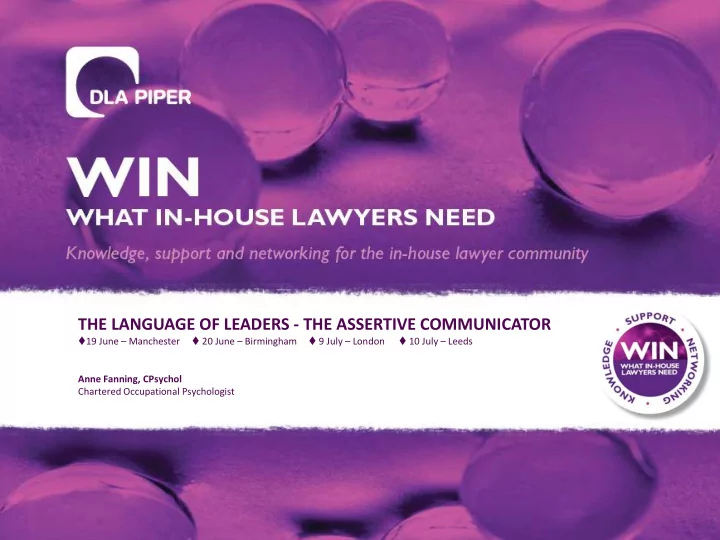

THE LANGUAGE OF LEADERS - THE ASSERTIVE COMMUNICATOR 19 June – Manchester 20 June – Birmingham 9 July – London 10 July – Leeds Anne Fanning, CPsychol Chartered Occupational Psychologist
The Assertive Communicator Anne Fanning, Psychology for Business Ltd 2013
The Assertive Communicator Objectives Know how your personality type influences how you communicate with others Explore ways to communicate effectively with other personality types Feel more confident in managing your colleagues and your manager Anne Fanning, Psychology for Business Ltd 2013
The Assertive Communicator A definition of assertive communication Why is assertive communication helpful? Anne Fanning, Psychology for Business Ltd 2013
The Assertive Communicator Definition: Assert your own needs while still considering and respecting the needs of others. Anne Fanning, Psychology for Business Ltd 2013
The Assertive Communicator Benefits: Strengthen relationships Reduce stress from conflict Avoid work overload Handle tricky situations more effectively. Anne Fanning, Psychology for Business Ltd 2013
The Assertive Communicator How? Use ‘I’ statements rather than ‘You’ Anne Fanning, Psychology for Business Ltd 2013
The Assertive Communicator How? Use ‘I’ statements rather than ‘You’ Avoid aggressive or passive statements Anne Fanning, Psychology for Business Ltd 2013
The Assertive Communicator How? Use ‘I’ statements rather than ‘You’ Avoid aggressive or passive statements Use facts, avoid personal comments Anne Fanning, Psychology for Business Ltd 2013
The Assertive Communicator How? Use ‘I’ statements rather than ‘You’ Avoid aggressive or passive statements Use facts, avoid personal comments Know about your communication preferences and theirs – and use that knowledge Anne Fanning, Psychology for Business Ltd 2013
The Assertive Communicator Personality questionnaire: Bolton and Bolton Assertiveness: Ask or tell? Responsiveness: People or task-oriented? 75% of people (at least!) are different from you Anne Fanning, Psychology for Business Ltd 2013
The Assertive Communicator Questionnaires – results Anne Fanning, Psychology for Business Ltd 2013
Personality types Anne Fanning, Psychology for Business Ltd 2013
Personality types Reflective and thoughtful Steady influence on others Restrained, unassuming Hesitant, quiet manner Appears unemotional and cool Analyses rather than acts Anne Fanning, Psychology for Business Ltd 2013
Personality types Active and ambitious Independent Driver Appears self confident Takes initiative Strong-willed and forceful Willing to confront others Sense of urgency Anne Fanning, Psychology for Business Ltd 2013
Personality types Highly sensitive Feelings oriented Amiable Shows empathy Patient and avoids hurting others Eager to please Needs to be praised Anne Fanning, Psychology for Business Ltd 2013
Personality types Takes things personally Fun-loving Inclined to generalise and exaggerate Likes selling – especially self! Outgoing and friendly Egotistical Anne Fanning, Psychology for Business Ltd 2013
The Assertive Communicator Group work: Formulate a response to the situations described in the handout Practise the responses using another group: Analyticals to meet Expressives and Amiables to meet Drivers Review the reaction and reconsider the response Anne Fanning, Psychology for Business Ltd 2013
Personality types: what’s important Anne Fanning, Psychology for Business Ltd 2013
The Assertive Communicator Analyticals: Give me the details Amiables: Show me you care Drivers: Be bright, be brief, be gone! Anne Fanning, Psychology for Business Ltd 2013
Thank you Any further questions? Please speak to us after the event or email us - win@dlapiper.com Your feedback is important to us Please take a minute to fill in the form on your seats Register today: www.dlapiperwin.com to be included on future events
Recommend
More recommend